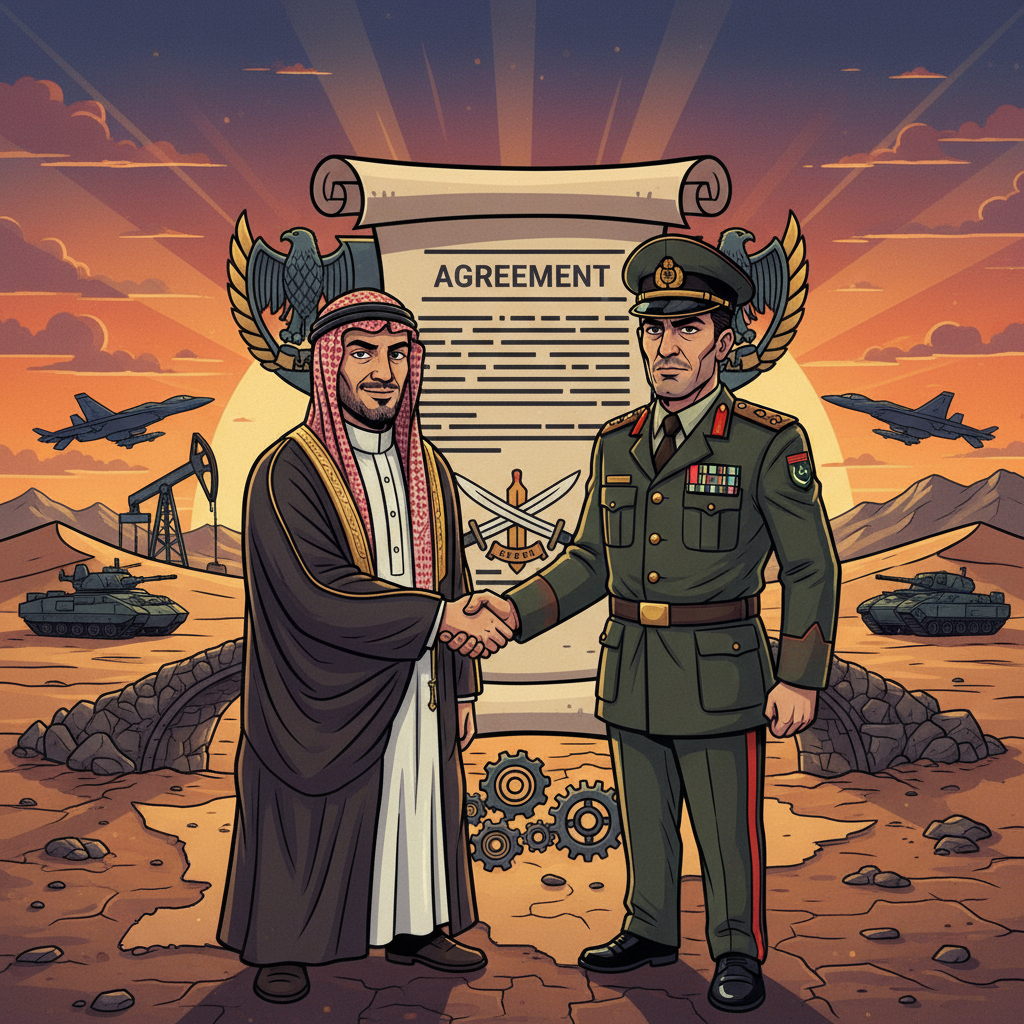Shifting Sands: Saudi Arabia and Pakistan Forge Landmark Defense Pact
In a move sending shockwaves through the geopolitical landscape, Saudi Arabia and the nuclear-armed nation of Pakistan have signed a sweeping Strategic Mutual Defense Agreement.

The landmark pact, signed in Riyadh, establishes a powerful new alliance with a stark commitment: "any aggression against either country shall be considered an aggression against the other." This formalizes a deep strategic bond between the two influential Muslim-majority nations and represents one of the most significant realignments in regional security in decades.
The agreement is far more than a simple declaration of mutual support. According to media reports, the pact is comprehensive, including provisions for extensive defense industry collaboration, significant technology transfer, and joint military co-production. This deal deepens a relationship that has been growing for over 70 years, building on a foundation first laid by a "Treaty of Friendship" signed in 1951. By integrating their military-industrial capabilities, both nations are signaling a long-term commitment to a shared security future independent of traditional Western alliances.
The ramifications of this pact are already being felt across the globe, forcing nations like India and Israel to reassess their strategic calculations. Some analysts are already referring to the agreement as the foundation of an "Islamic Nato," a powerful new bloc capable of projecting influence and altering regional power dynamics. This strategic pivot comes as Saudi Arabia diversifies its security partners, turning to its long-standing ally Pakistan to create a more formidable defensive posture in an increasingly volatile Middle East.
While the agreement brings the Kingdom of Saudi Arabia into a formal defense pact with the Muslim world's only nuclear power, some experts caution against viewing it as a simple "nuclear umbrella." The full extent of nuclear cooperation remains unstated. However, there is no ambiguity that this watershed agreement reshapes the region's security architecture. The world will be watching closely as this powerful alliance between Riyadh and Islamabad develops and begins to assert its newfound strategic weight on the international stage.
I use ProtonVPN with Proton Unlimited to secure my digital footprint. With no-logs policy, end-to-end encryption, and Swiss privacy, it keeps me safe online.
Benefits I love:
- Proton Sentinel: AI-powered protection against suspicious logins.
- Fast, Global Access: 12,000+ servers in 120+ countries for seamless streaming.
- NetShield: Blocks ads and malware.
- All-in-One: Includes Proton Mail, Drive, Calendar, and Pass with 500GB storage.
Trust ProtonVPN like I do!
Other News
We live in a moment defined by fractures. The lines that once seemed stable—between political rivals, between allied nations, and even between a citizen and their daily commute—are fraying under immense pressure. From bitter divisions within our own government agencies to the high-stakes maneuvering of global superpowers, a series of seemingly separate events paints a singular picture of a world on edge, grappling with violence, espionage, and a realignment of power not seen in generations.
The Home Front: A Nation Divided by Politics and Fear
The fallout from political violence is no longer a distant headline; it's a raw and present reality. In the tragic aftermath of conservative activist Charlie Kirk’s assassination, a battle is being waged not just for justice, but for his very legacy. As conspiracy theories swirl online, allies—including Israeli Prime Minister Benjamin Netanyahu—are stepping forward to reaffirm his staunch, faith-based support for Israel, fighting to prevent his life's work from being twisted by disinformation.
This specter of political violence looms large in the courtroom as well. The federal trial of Ryan Routh, the man accused of attempting to assassinate President Donald Trump, is nearing its conclusion. An ATF explosives expert recently testified that the array of homemade devices found in Routh's possession had no purpose “other than being used as a weapon,” a chilling reminder of the premeditated nature of such attacks.
This high-stakes tension is bleeding into everyday life, stoking public fear in the most mundane of places. A shocking attack on a Boston bus, where an elderly woman was shoved onto the sidewalk, has heightened commuters’ fears nationwide. The incident comes just weeks after the tragic stabbing death of a Ukrainian refugee on a Charlotte light-rail train, fueling a crisis of confidence in public safety and leaving many to wonder if any space is truly safe from random violence.
The fractures are just as evident within the halls of power. In an extraordinary public rebuke, FCC Commissioner Anna Gomez has accused her own agency’s leadership of “weaponizing its licensing authority” to censor broadcasters. The accusation comes after FCC Chair Brendan Carr warned ABC of potential repercussions for comments made by Jimmy Kimmel following Charlie Kirk’s killing. Gomez argues the agency is engaging in a “campaign of censorship,” using the threat of revoking valuable broadcast licenses—a difficult and rare process—to create a chilling effect. "The threat is the point," she stated, highlighting a deep, internal struggle over the limits of government power and free speech.
The Global Chessboard: Superpowers Maneuver and Alliances Fray
While the U.S. contends with its internal divisions, the global chessboard is being reset at a dizzying pace. In a clear message to near-peer adversaries like China and Russia, U.S. Air Force Special Operations Command recently staged a mock takeover of an airport in the Caribbean. The exercise, designed to practice the rapid setup of small, dispersed bases, was a demonstration of America’s readiness to project decisive power in its own hemisphere.
The need for such tactics is underscored by the relentless pace of military innovation abroad. New satellite imagery has revealed a massive, previously unseen stealth flying-wing drone at a secretive Chinese test base. This new aircraft is just the latest entry in China's expanding arsenal of low-observable drones designed for surveillance and strike missions, highlighting the technological race that is defining 21st-century military competition.
In what could be a stunning countermove, President Donald Trump announced that the U.S. is “working to take back” Bagram Air Base in Afghanistan, four years after the chaotic withdrawal. Casting the move as a direct check on Beijing, Trump noted the base is just “an hour away from where China makes its nuclear weapons.” This potential return to an old battlefield for a new strategic purpose represents a dramatic rethinking of Central Asian geopolitics.
This great-power tension is also sowing division among allies. In Europe, Germany's Green party has sounded a major alarm, warning that a joint nuclear project between French and Russian state-owned companies could serve as a "gateway for spies." They argue that at a time of unprecedented hostility with Moscow, allowing Russian entities access to sensitive European nuclear infrastructure is a grave security risk. The dispute highlights the deep fault lines within the Western alliance over how to balance energy needs with the persistent threat of Russian espionage and influence.
From a fractured FCC to a potential return to Afghanistan, these events are not isolated incidents. They are symptoms of a volatile and unpredictable era, where the conflicts of the future are being shaped by the divisions of today.
Today's VA Mortgage Rates
30-Year VA Loan Rates:
- Veterans United Home Loans (as of Sep 18, 2025):
- Purchase Rate: 5.375%
- Refinance Rate: 5.500%
- Navy Federal Credit Union:
- Rate: 5.250%
- Wells Fargo:
- Rate: 5.500% (APR: 5.714%)
- Bankrate (National Average as of Sep 18, 2025):
- APR: 6.77%
- Refinance APR: 7.73%
15-Year VA Loan Rates:
- Navy Federal Credit Union:
- Rate: 4.750% (APR: 5.431%)
👋 Follow Me!
If you enjoy my content, please follow me on Social Media and consider sharing this content with your friends! Thank you so much for reading today's article!
𝕏 / Threads / Facebook / Instagram
Views are solely those of That Smoke Pit Veteran, not reflecting the U.S. Government or Defense / War Department's stance, policies, or endorsements. Content is for informational & entertainment purposes only, not affiliated with or endorsed by any government.


